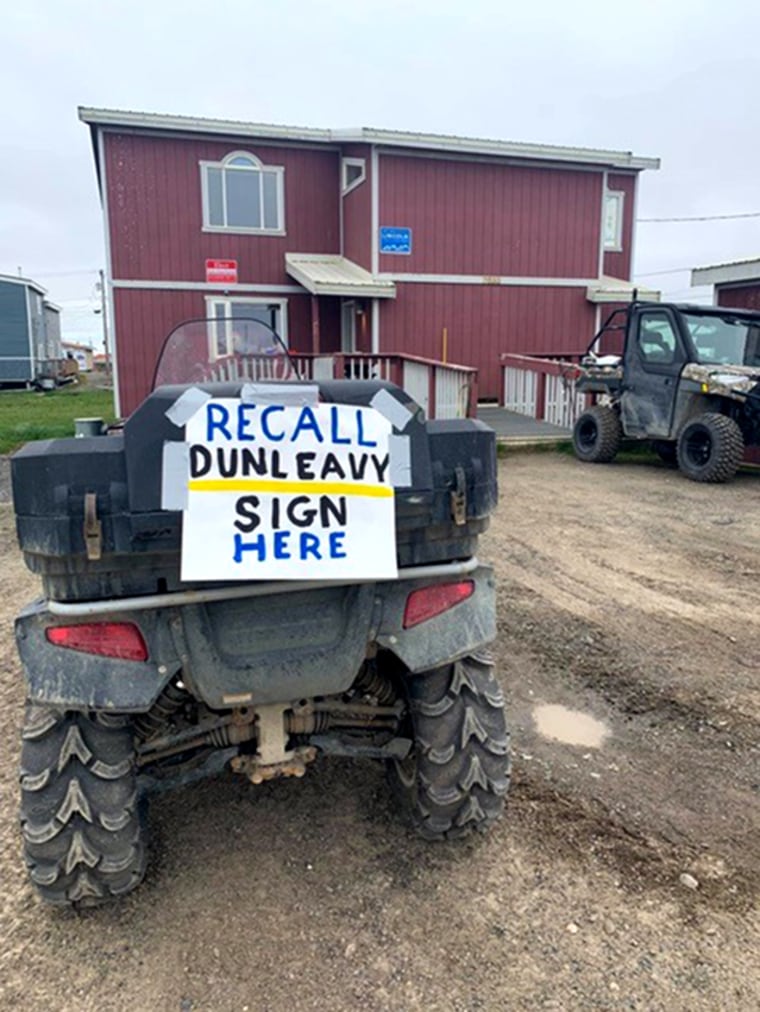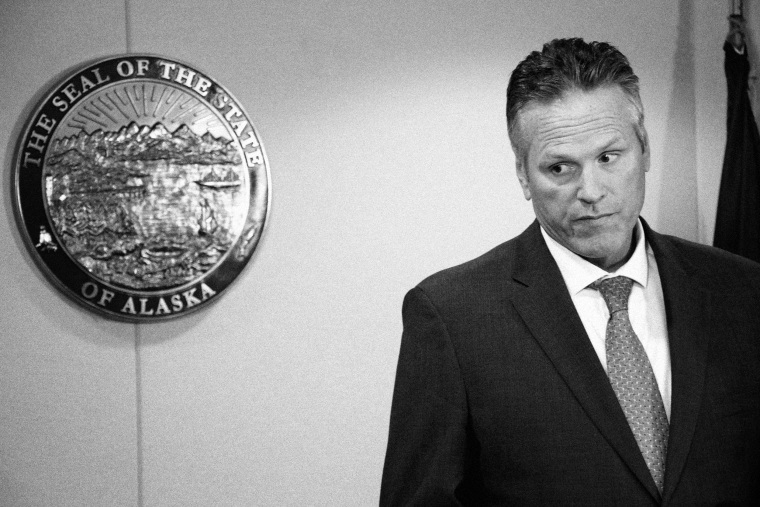Last summer, Alaska's famous bright nights had dimmed for many residents.
The state's governor, Mike Dunleavy, a Republican and a Trump ally in office a little more than six months, had campaigned on restoring the state's annual oil wealth dividend, a decades-old stipend given to Alaskans off the state's oil and gas surplus that had been cut back in recent years as oil prices declined. But to do so, Dunleavy maintained that he had to veto 182 line-items from the state budget, totaling more than $440 million.
Residents of the state were aghast: The suggested cuts would gouge primary and university education, Medicaid, services for the homeless, addiction treatment and public transportation, including a ferry that connects Alaskans in remote areas to essential services. Advocates and state lawmakers scrambled to figure out how their communities could move forward without desperately needed funds. Under pressure, Dunleavy scaled back some of the cuts, but Alaskans on both sides of the political aisle had seen enough. They formed "Recall Dunleavy" to remove him from office.
Kicking an elected official, be it an executive, a legislator or a judge, out of office is never easy, but in Alaska, a state known for pride in both its natural resources and its resourcefulness, the idea took hold quickly and spread widely. A poll last summer found Dunleavy with only a 31 percent approval rating as widespread dissatisfaction with him swept the state.
But then came the pandemic, which curtailed the ability of recall petitioners to reach fellow citizens, and made even supporters reconsider if it was, indeed, time to switch leaders.
Months before the coronavirus outbreak set in, Recall Dunleavy already had its work cut out: First, the group had to navigate the state's multistep recall process. That meant collecting 28,501 signatures — or 10 percent of the state's voting population in the last election — then submit an application detailing for the Division of Elections the legal grounds for why it believed Dunleavy had violated his oath of office.
With that approval in hand, Recall Dunleavy could then begin the petition process, which required gathering 71,000 signatures, or 25 percent of the voting population. Checking all those boxes would lead to either a special election or a line-item recall question on the general election ballot in November. It was daunting, but didn't seem impossible.
On launch day, Aug. 1, 2019, the group immediately picked up 10,000 signatures. Alaskans were angry, and the movement quickly gathered speed, collecting 40,000 more signatures in just a month. But that early momentum then stalled. State Attorney General Kevin Clarkson, a Republican and a Dunleavy appointee, rejected the recall movement's legal case. Recall Dunleavy sued, and on May 8, Alaska's Supreme Court ruled the recall grounds legal, allowing the process to finally continue.
But by the time all the legal hurdles were cleared, the movement had lost steam. The state was now in the middle of the COVID-19 crisis, and all those ways in which recall activists might have reached their far-flung neighbors were suddenly out of reach. There would be no door-to-door canvassing, signature drives or even tabling at local gathering places. The bipartisan, grassroots coalition was flattened, and its leadership had to figure out how to adapt.
"We initially had over 60 launch events over the course of a week and half in February when we started the petition phase of the recall," said Claire Pywell, campaign manager of Recall Dunleavy. As COVID moved in, they shifted strategies. When Alaska locked down, they began a "sign at home" campaign, sending petition booklets to Alaskans who requested them and collecting signatures by mail. But that largely reached only those who were already supporters of the recall.

Recall Dunleavy "seemed quite likely to win last summer if there would've been an election held at the time" said Chanda Meek, an associate professor at the University of Alaska who studies the state's politics. "Now, I would probably give it a 50/50 chance."
Where once state residents were aware of a broad spectrum of issues, Meeks said the pandemic had obviously narrowed the discussion. She also said many Alaskans have been satisfied with Dunleavy's COVID-19 response, as he deferred to the state's chief medical officer, Dr. Anne Zink, who shepherded the state through the spring with a low case rate (although it is now beginning to rise again). A poll conducted in April by researchers from Harvard, Northeastern and Rutgers showed 53 percent of Alaskans approved of his handling of the pandemic. (The governor's office said it does not comment on the recall effort.)
Pywell says the recall movement is just as important as ever and is adapting to the times. The pandemic, she said, makes issues like cutting Medicaid all the more salient. But time isn't on the recallers side. They've collected just over 37,000 signatures for round two, and need almost twice that by the first week of August to get the question on the general election ballot.
So Recall Dunleavy has taken a cue from the virus that slowed its effort, pushing drive-thru petition-signing drives in Anchorage and Fairbanks, the state's two biggest cities, as well as smaller towns like Ketchikan, Cordova, Skagway and Sitka.
Just like drive-thru coronavirus testing sites, volunteers wearing masks and gloves guide Alaskans through the signature process. After signing the petition, the signee holds it against their car window for a volunteer to make sure everything is properly filled out. Once given the all-clear, the signee drives to the next station to drop the petition off in a bin. Bringing your own pen is strongly encouraged.
"We're trying to make it as easy and safe as possible," Pywell said. "A pandemic isn't going to stop people from exercising this constitutional right."
The group's most effective tactic, she said, remains "Alaskan to Alaskan" discussions, where people talk to one another about why they support the movement. Pywell and her volunteers are also setting up phone banks to encourage people to go to the drive-thrus.
Not everyone is optimistic. Aidan Smith, an electoral analyst at the progressive think tank Data for Progress, said the pandemic has "completely devastated" progressive and grassroots organizing by denying groups the ability to have the sort of person-to-person interaction that can sway an uncertain voter. "On-the-ground organizing is crucial if you're running a campaign that doesn't have big money to spend on conventional advertising techniques," he said.
As a result, Smith said, he suspects that incumbents will be able to maintain their grip on power during the coronavirus crisis. "In addition to the obvious tragedies of COVID, the political consequences of this cycle in particular are depressing" he said.
But on-the-ground activists aren't ready to give up just yet. After all, Dunleavy was still unpopular as 2019 came to a close, deemed the nation's ninth-most unpopular governor by the polling company Morning Consult, with a 42 percentage approval rating.
Kelly Merritt, a retired teamster from Anchorage and a volunteer with Recall Dunleavy, is determined not to let COVID-19 destroy the movement.
"Our momentum had to be stopped for the pandemic, but it hasn't stopped in any of our hearts," Merritt said. "And when you're stopped in your tracks because of a pandemic, it will take a little while to go back."
Still, Merritt said she has "no doubt in her mind" that the recall will be on the ballot. She's been making phone calls and helping to coordinate the drive-through testing sites, but she misses the face-to-face interactions of organizing.
"I can't wait to get back on the street."

